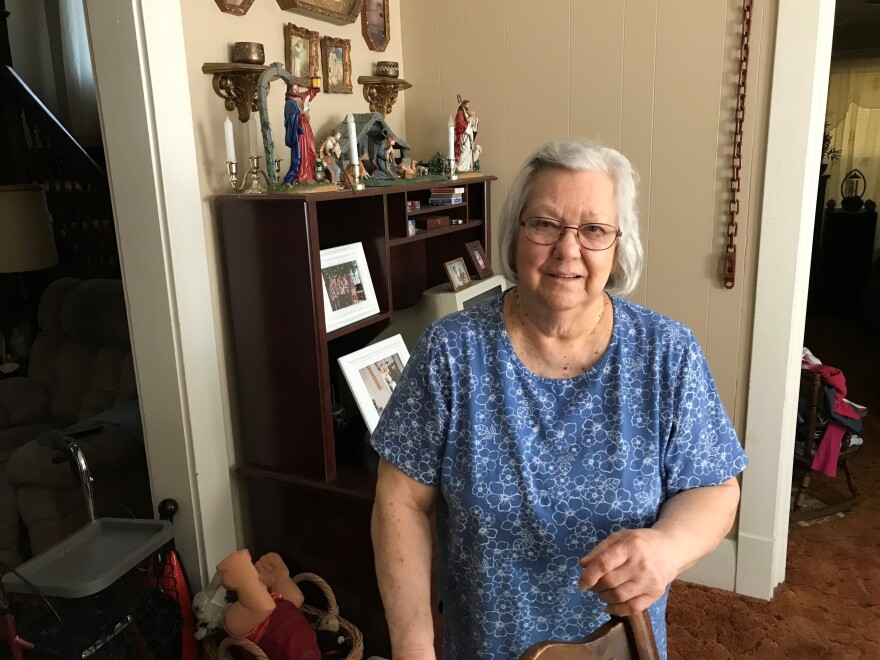In the Gordon Square neighborhood where I live, homeowners and renters often mention Cleveland's property tax policies as favoring newer residents over longer-term ones.
But no one’s story brought all of this into focus for me more vividly than Helen Massie’s.
Helen and her late husband moved to Cleveland from West Virginia in the late 1960s. They raised three boys, and both worked for the General Electric plant in East Cleveland – a place famous in Northeast Ohio for its annual holiday light display.
The Massies bought their house for about $16,000, an amount that remained the average sales price for a house in the neighborhood all the way up until 2002. Now, though, things are different.
"The house next door went for $474,000 or something like that," she told me. "And [investors] have been coming here wanting to buy this house."
But she doesn't want to sell.
"I want to be just like my husband," she said. "I want to live here 'til I die."
A question of fairness
For years, her plan to stay seemed entirely reasonable. For more than 30 years, Helen’s taxes rose very slowly. That’s not entirely a good thing, because it also means that the value of her house was stagnant — or, really, declining when you account for inflation. That’s the plight of so many houses in so many Cleveland neighborhoods to this day.
But the good part was that for Helen, the cost of living here was very predictable and very affordable from year to year.
That changed in a big way in 2018, when her property taxes more than doubled.
"It's hard," she said. "I'm pretty sure I'll have to ask my kids for help."
There is an official way to appeal a hike in property taxes. Homeowners can file an appeal with the Cuyahoga County Board of Revision, the government agency that decides how much houses are worth. It involves putting together lots of paperwork and then making an appearance before a board of commissioners.

One of Helen’s sons recently filed on her behalf, she said, but the appeal was denied.
"They said, 'There's nothing you can do,'" Helen said. "And [my son] said, 'Well, my mom will probably have to sell her house.' They said, 'Well, that's what you'll have to do. They're not lowering the taxes.'"
Helen said she doesn’t worry about having to sell her house any time soon. She’s got income from Social Security, and both her and her husband’s pensions. Still, it’s not a ton, especially when you factor in the costs of maintaining an old house. And with her taxes going up again in 2020, she’s concerned she may not be able to spend the rest of her life here as she’d always planned.
Making matters worse, she said, is what she views as the unfairness of a tax system that raises her taxes while providing tax breaks for people who are wealthier and newer to the neighborhood.
She pointed across the street to the high-end townhouses, the ones she looks at every time she steps out the front door.
"I think these people over here have a 15-year tax abatement," she said. "And I think what they're doing is raising everybody else's to make up for that or something. I don't know. I feel it's wrong."
Helen is talking about the city of Cleveland’s tax abatement program. Since the 1990s, that program has given developers and homeowners a 15-year pass on paying taxes on new construction, and a 10-year pass on major renovations. Some neighborhood leaders credit it with being a huge factor, maybe the biggest single factor, in bringing back a functioning housing market to my neighborhood and a few others in Cleveland.
But almost since its creation, longtime property owners have also criticized tax abatement as being unfair. And it doesn’t just affect property owners. Landlords pass those increases down to their renters.
Tax abatement policies were recently reformed to relieve development pressure in popular neighborhoods, but they still exist. This episode explores our very uneven system of property taxes in Cleveland, and the attempts being made to make it more fair.
Sign up for our behind-the-scenes newsletter to get more stories from the neighborhood, and tell us what you think in our audience survey.








